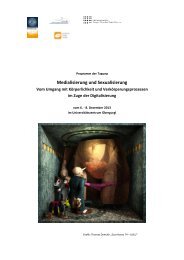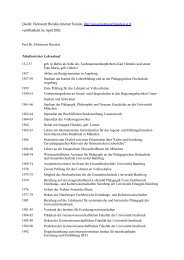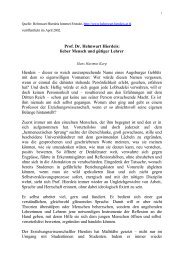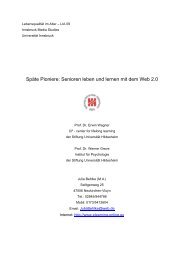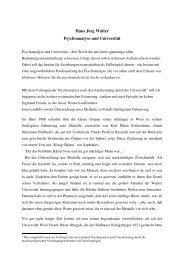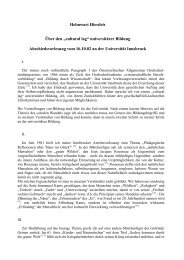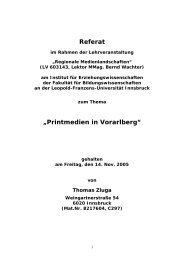Download pdf - Universität Innsbruck
Download pdf - Universität Innsbruck
Download pdf - Universität Innsbruck
Sie wollen auch ein ePaper? Erhöhen Sie die Reichweite Ihrer Titel.
YUMPU macht aus Druck-PDFs automatisch weboptimierte ePaper, die Google liebt.
Culture Wide Closed 107<br />
Pirate monopolies<br />
In the light of the critiques already mentioned, we would like to add some more perspectives<br />
on the question of the commons and the culture of sharing. First of all, it is extremely<br />
important how we define freedom in ‘free culture’. The argument of Free as in ‘free<br />
speech’ is most prominently used when the police try to close down the file sharing sites.<br />
Freedom in this case is understood as an alternative to communism. There is a strong historical<br />
layer in the concept of freedom in Bulgaria that leads us back to 1989 and further<br />
back to the 45 year period of socialist rule. The battle between the police and Arena and<br />
Zamunda is interpreted as a battle between open society and the State, the System, The<br />
Power (always with capital letters). Piracy is regarded as a form of dissidence. The public<br />
story of Zamunda and Arena functions a bit like the myth as defined by Claude Lévi-<br />
Strauss. It outlines the conflict between power and ordinary citizens and resolves it in<br />
piracy. What is neglected in these mythical dimensions is the fact that someone gains great<br />
profit from file sharing.<br />
The mantra of the bottom-up open networks is indeed romantic. But we should be very<br />
careful when we apply it. The two biggest file sharing sites in Bulgaria were not created<br />
by active citizens, and their ownership is subject to speculation. It is not that easy to make<br />
a successful torrent tracker. All in all, the trackers in Bulgaria are around 77, but Zamunda<br />
is the absolute monopolist, followed by Arena. The more users a tracker has, the more<br />
interesting and diverse torrents it offers, and the more users it attracts. It is a simple principle<br />
typical of the overall development of Internet business. While constantly praising the<br />
democratic networks and the wealth of choice, we should not overlook the fact that every<br />
business niche in the world nowadays has been taken over by one or a few big companies:<br />
Google, Facebook, Amazon (Wu, 2010). Accordingly, in Bulgaria Zamunda is the absolute<br />
monopolist, sharing the market with Arena in a mutually profitable collaboration, because<br />
neither of them has the technical capacities to handle alone the current amount of users.<br />
The main focus of our criticism is that Arena and Zamunda use their position to lend space<br />
for online ads and extract profits. As these sites do not produce content, they can offer<br />
lower prices for advertising and destroy the level playing field. Many of the sites which<br />
actually produce content cannot gain from ads and they are forced to introduce paid access.<br />
This in turn harms the users because it diminishes the diversity and the quality of the<br />
content they have access to. This is not an argument against torrent sites in general but<br />
against the commercial ones who act pretty much like parasites. They profit from free<br />
content, as they get money from advertising. On a second level, they profit from the very<br />
rhetoric of sharing, as it brings them public support, more users, and respectively – more<br />
money.<br />
Every time Arena and Zamunda are threatened by the police, they publish open protest<br />
letters and quite successfully invoke the spirit of civil society in their defence. At the same<br />
time in all official interviews the owner of Arena speaks against piracy and insists that the



